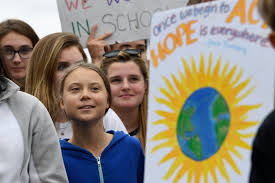The environmental crisis is not new news. It has been going on for thirty years. I would like to share a piece that was in the September/October issue of Sojourners magazine that you could use for your class or, at the very least, inspire you to do something about the situation we find ourselves in. The students could read it, ask questions, and start the conversation on a climate strike. Let’s empower the students to make change and possibly even empower ourselves.
Bill McKibben is the founder of 350.org. His most recent book is Falter: Has the Human Game Begun to Play Itself Out?
Since last September, when Swedish schoolgirl Greta Thunburg began her one woman campaign, school strikes have happened around the planet. At their height, in the spring, 14 million left class for a day, demanding that our leaders actually lead on the greatest crisis the planet has ever faced. In May, the students asked adults to join them, and so the first all-ages climate strike will take place across the planet.
Here is why you should join in making it the largest day of climate protest in history.
1. Because the climate crisis just keeps deepening.
When I wrote the first book about all this, 30 years ago this fall, scientists were issuing warnings about what would happen if we didn’t act. We didn’t act and now instead of warnings we are issuing body counts. Wildfire, flood, the spread of insects carrying disease: The iron law of climate change is that it affects first those who have done the last to cause it. But by now it’s reaching every part of the planet. Last autumn in California, we watched a city literally called Paradise almost literally turn into hell inside half an hour. This spring, we watched the relentless flooding across the richest grain belt of the planet.
2. Without rapid, trans-formative action, it’s going to get much worse.
So far, we have raised the temperature of the planet one degree Celsius – about 1.8 degrees Fahrenheit. But we’re on course not, unless something changes fast, to see it rise 3.5 degrees Celsius – 6 degrees Fahrenheit -by century’s end. Scientists say that would preclude civilization as we’ve known it.
3. We could change if we got our act together.
Engineers have worked small miracles, the price of solar power has dropped almost 90 percent in the last decade. So, if our government and financial institutions put their mind to it, rapid change is truly possible (and it would save us the vast amounts of money that would otherwise be spent trying to defend against cataclysm).
4. There is a big movement demanding change but it needs to get much bigger.
Right now, leadership is coming from front-line communities most affect by change. It’s coming from Indigenous communities around the planet. It’s coming from scientists and people of faith. But it needs to come from everyone! This is the defining issue of our lifetime – you need to to not just worry about it, but to get out in the street.
5. A strike – if only for a day – is the perfect way to do it.
We have to show that we’re willing to disrupt business as usual. Right now, despite the unfolding crisis, we most just get up in the morning and do what we did the day before – business as usual is literally what’s killing us.
6. It’s not okay to make ninth-graders save the planet by themselves.
So, go to globalclimatestrike.net and make yourself an organizer for a day. It’s not hard and you will sleep better.
____________
It would be totally cool if we managed to get five people involved in the climate crisis. Go ahead and sign up for this vitally important cause!

 RSS Feed
RSS Feed